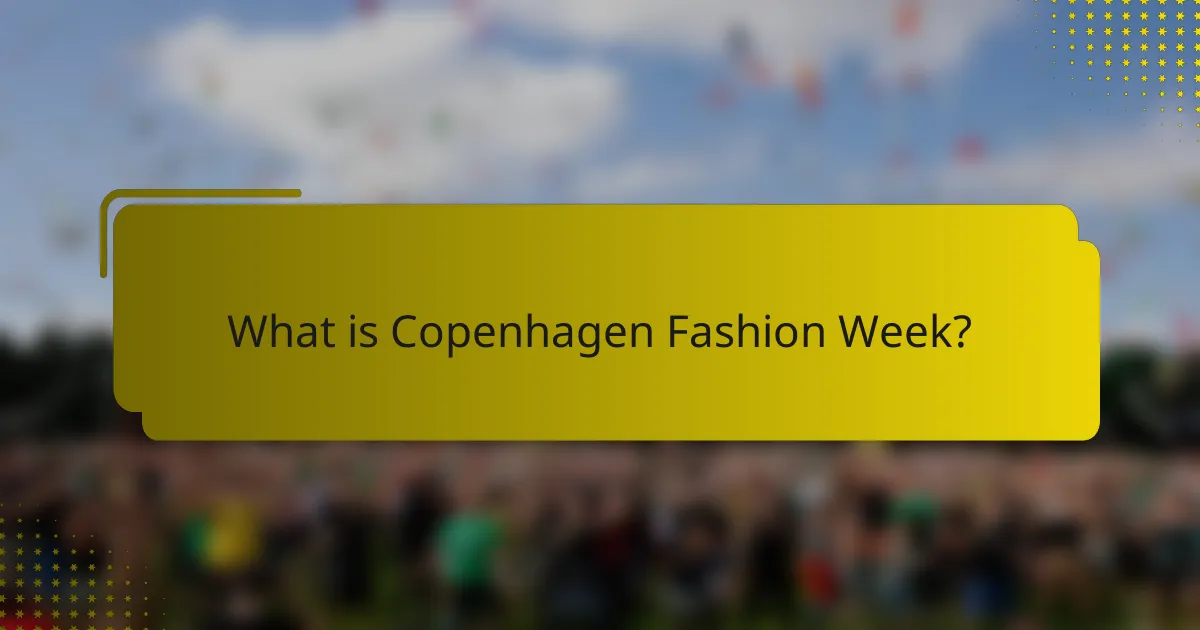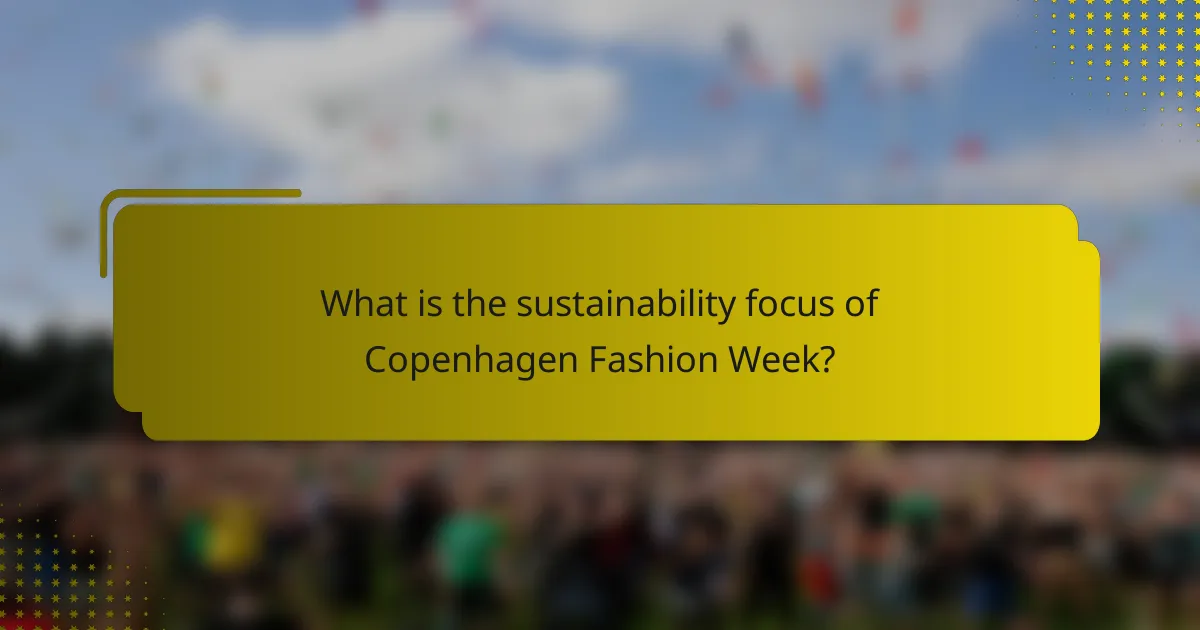
What is Copenhagen Fashion Week?
Copenhagen Fashion Week is a biannual fashion event held in Copenhagen, Denmark. It showcases collections from both established and emerging designers. The event typically occurs in February and August. Copenhagen Fashion Week emphasizes sustainability and ethical fashion practices. It has gained recognition for promoting eco-friendly initiatives within the fashion industry. The event attracts international attention and industry professionals. It serves as a platform for innovation and creativity in fashion. Copenhagen Fashion Week aims to influence global fashion trends while prioritizing environmental responsibility.
How did Copenhagen Fashion Week originate?
Copenhagen Fashion Week originated in 2006. It was established to showcase Danish fashion designers and promote the local fashion industry. The event aimed to create a platform for emerging talents and established brands. Over the years, it has evolved into a significant event in the global fashion calendar. The initiative was driven by a desire to emphasize sustainability and responsible fashion practices. Copenhagen Fashion Week has since gained recognition for its commitment to eco-friendly initiatives. The event has attracted international attention and participation from various global brands. It continues to influence fashion trends while promoting sustainable practices.
What historical events shaped Copenhagen Fashion Week?
Copenhagen Fashion Week was shaped by several key historical events. The first event was its establishment in 2006, which aimed to elevate Denmark’s fashion industry on a global scale. The second significant event was the introduction of sustainability initiatives in the early 2010s. This move aligned with Denmark’s broader focus on environmental issues. In 2019, Copenhagen Fashion Week committed to becoming the world’s first sustainable fashion week. This commitment was reinforced by the Fashion Agenda, which set guidelines for sustainable practices. The COVID-19 pandemic in 2020 also impacted the format and scheduling of the event, leading to digital showcases. These events collectively influenced the evolution and reputation of Copenhagen Fashion Week in the fashion industry.
How has the event evolved over the years?
Copenhagen Fashion Week has evolved significantly since its inception in 2006. Initially, it was a small event focused on showcasing local designers. Over the years, it has grown into a major international fashion platform. The event now emphasizes sustainability and ethical practices. In 2021, it introduced a sustainability action plan for participating brands. This plan aims to reduce environmental impact and promote responsible fashion. The event has also expanded its venues, featuring unique locations across the city. This shift enhances the overall experience for attendees and participants. The evolution reflects broader trends in the fashion industry towards sustainability and innovation.
What distinguishes Copenhagen Fashion Week from other fashion weeks?
Copenhagen Fashion Week is distinguished by its strong focus on sustainability. The event emphasizes eco-friendly practices and ethical fashion. It is one of the first major fashion weeks to adopt a sustainability mandate. This includes requiring participating brands to meet specific environmental criteria. Copenhagen Fashion Week also showcases a diverse range of Scandinavian designers. The unique venues often reflect the city’s architectural beauty. Additionally, it promotes inclusivity and innovation in fashion. These elements set it apart from traditional fashion weeks globally.
What unique aspects define its identity?
Copenhagen Fashion Week is defined by its commitment to sustainability and innovative venues. The event showcases eco-friendly fashion brands and promotes sustainable practices. It emphasizes circular fashion, encouraging designers to adopt environmentally responsible methods. Unique venues, such as historic buildings and outdoor spaces, enhance the event’s appeal. This distinctive setting provides a backdrop for creative presentations. The week also integrates local culture, showcasing Danish design and craftsmanship. Its focus on inclusivity and diversity sets it apart from other fashion weeks. Copenhagen Fashion Week leads in setting sustainability standards within the fashion industry.
How does its location influence the event?
Copenhagen Fashion Week’s location significantly influences the event by integrating local culture and sustainability practices. The city’s commitment to eco-friendly initiatives shapes the fashion showcased. Venues are often chosen for their architectural significance and environmental credentials. Proximity to vibrant neighborhoods enhances accessibility for attendees. Copenhagen’s reputation as a design hub attracts international attention. The location fosters collaboration with local designers and brands. Additionally, the city’s infrastructure supports seamless logistics for participants. Overall, the location amplifies the event’s focus on sustainability and innovation.

What are the unique venues of Copenhagen Fashion Week?
Copenhagen Fashion Week features unique venues that enhance its creative atmosphere. Notable locations include the historic Royal Danish Theatre, which offers a grand backdrop. The former Carlsberg Brewery provides an industrial chic setting. The Copenhagen Opera House showcases modern architecture and stunning views. Additionally, the Designmuseum Danmark highlights Danish design heritage. These venues contribute to the overall experience of the fashion event. Each location reflects Copenhagen’s commitment to sustainability and innovation.
Which venues are most commonly used during the event?
The most commonly used venues during Copenhagen Fashion Week include the Copenhagen Opera House, the Royal Danish Theatre, and the former Carlsberg Brewery. These locations are chosen for their unique architecture and cultural significance. The Opera House offers a stunning waterfront view, enhancing the fashion showcase experience. The Royal Danish Theatre provides a historic and elegant backdrop for runway shows. The Carlsberg Brewery, with its industrial charm, adds a contemporary touch to the event. Each venue reflects Copenhagen’s commitment to sustainability and innovation in fashion.
What architectural features make these venues special?
The architectural features that make these venues special include innovative designs and sustainable materials. Many venues incorporate eco-friendly elements, such as green roofs and energy-efficient systems. Unique structural shapes and layouts enhance the aesthetic appeal. Natural light is maximized through large windows and open spaces. The integration of local art and culture adds a distinctive character. Historical elements are often preserved, creating a blend of old and new. These features contribute to a memorable experience for attendees. Copenhagen’s commitment to sustainability is reflected in the architecture of these venues.
How do the venues enhance the overall experience of the event?
Venues enhance the overall experience of the event by providing unique atmospheres that reflect the event’s theme. For Copenhagen Fashion Week, venues are often selected for their architectural significance and aesthetic appeal. This creates a visually stimulating environment for attendees. Additionally, venues contribute to the event’s sustainability focus by utilizing eco-friendly designs and materials. The integration of local culture and art within the venues also enriches the experience for participants. Furthermore, well-chosen venues facilitate better attendee engagement and networking opportunities. These elements collectively elevate the event’s impact and memorability.
How does the choice of venue reflect sustainability efforts?
The choice of venue reflects sustainability efforts by prioritizing eco-friendly locations. Sustainable venues often utilize renewable energy sources. They may feature green building certifications such as LEED. Additionally, venues that promote local sourcing reduce transportation emissions. Choosing spaces with efficient waste management systems further supports sustainability. For example, Copenhagen Fashion Week selects venues that align with its sustainability goals. This includes spaces that implement water conservation practices. Such choices demonstrate a commitment to environmental responsibility in event planning.
What sustainable practices are implemented in these venues?
Sustainable practices implemented in these venues include waste reduction initiatives and energy-efficient systems. Venues often utilize renewable energy sources, such as solar panels. They also promote recycling and composting programs to minimize landfill contributions. Many venues incorporate sustainable materials in their construction and design. Water conservation measures are frequently adopted, such as low-flow fixtures. Additionally, venues may partner with local suppliers to reduce transportation emissions. These practices align with Copenhagen Fashion Week’s commitment to sustainability. The event aims to set a standard for eco-friendly practices in the fashion industry.
How do venues contribute to the event’s eco-friendly initiatives?
Venues contribute to an event’s eco-friendly initiatives by implementing sustainable practices. Many venues use energy-efficient lighting and renewable energy sources. They often provide recycling and composting options for waste management. Venues may prioritize local sourcing for food and materials, reducing transportation emissions. Some venues incorporate green building designs that enhance energy efficiency. For example, venues might use sustainable materials in their construction and operations. They also promote public transportation access to reduce carbon footprints. Additionally, venues may partner with local organizations to support eco-friendly initiatives. These practices collectively enhance the sustainability of events held at these venues.

What is the sustainability focus of Copenhagen Fashion Week?
Copenhagen Fashion Week focuses on promoting sustainable practices within the fashion industry. The event encourages brands to adopt responsible production methods. It emphasizes transparency in supply chains and materials used. Copenhagen Fashion Week also sets criteria for participating brands to ensure sustainability commitments. The initiative includes a goal to reduce carbon emissions significantly. Moreover, it highlights the importance of circular fashion principles. This involves recycling and reusing materials to minimize waste. The event serves as a platform for innovative sustainable design solutions.
Why is sustainability important in the fashion industry?
Sustainability is important in the fashion industry because it addresses environmental and social impacts. The fashion industry is one of the largest polluters globally. It contributes significantly to water pollution, waste generation, and carbon emissions. For example, the industry accounts for about 10% of global carbon emissions. Sustainable practices reduce these harmful effects. They promote the use of eco-friendly materials and ethical labor practices. This shift helps protect natural resources and supports fair working conditions. Additionally, consumer demand for sustainable fashion is increasing. Brands adopting sustainable practices can enhance their market appeal and competitiveness.
What challenges does the fashion industry face regarding sustainability?
The fashion industry faces significant challenges regarding sustainability. One major challenge is the high environmental impact of textile production. According to the United Nations, the fashion industry contributes to 10% of global carbon emissions. Additionally, waste management is a critical issue. The Ellen MacArthur Foundation reports that a truckload of textiles is wasted every second. Another challenge is the reliance on fast fashion, which promotes overconsumption and short product lifecycles. This model leads to excessive resource depletion and pollution. Furthermore, supply chain transparency remains a barrier. Many brands struggle to trace the origins of their materials and ensure ethical practices. Lastly, consumer awareness and demand for sustainable practices are still developing. This gap complicates the transition to eco-friendly alternatives.
How is Copenhagen Fashion Week addressing these challenges?
Copenhagen Fashion Week is addressing challenges through a strong commitment to sustainability. The event has implemented a sustainability strategy that includes a focus on reducing carbon emissions. It encourages brands to adopt more eco-friendly practices and materials. The week features a dedicated sustainability program that highlights innovative solutions. Copenhagen Fashion Week also collaborates with industry stakeholders to promote responsible fashion. This includes partnerships with organizations that advocate for environmental protection. The event sets specific sustainability goals for participating brands to meet. As a result, it fosters a culture of accountability within the fashion industry.
What initiatives are being taken to promote sustainability?
Copenhagen Fashion Week is implementing various initiatives to promote sustainability. The event emphasizes eco-friendly materials in fashion collections. Designers are encouraged to use organic and recycled fabrics. The event also promotes circular fashion practices. This includes encouraging brands to adopt take-back programs for their products. Additionally, Copenhagen Fashion Week collaborates with sustainability experts for guidance. The initiative aims to reduce the overall carbon footprint of the fashion industry. In 2022, the event introduced a sustainability framework for participating brands. This framework sets clear sustainability goals and benchmarks for improvement.
What role do designers play in sustainability efforts?
Designers play a crucial role in sustainability efforts by creating eco-friendly products. They influence material choices, production methods, and consumer behavior. Designers can opt for sustainable materials, reducing environmental impact. They also consider the lifecycle of products, promoting longevity and recyclability. Through innovative designs, they can reduce waste and energy consumption. Their work can educate consumers on sustainable practices. Designers often collaborate with brands to implement sustainable strategies. Their influence shapes industry standards and trends towards sustainability.
How do brands participating in the event showcase sustainable practices?
Brands participating in the event showcase sustainable practices through eco-friendly materials and ethical production methods. Many brands utilize organic fabrics and recycled materials in their collections. They highlight transparency in their supply chains to demonstrate responsible sourcing. Additionally, brands often implement waste reduction strategies during production. Some engage in circular fashion initiatives, promoting recycling and upcycling. They may also offset carbon emissions through various sustainability programs. Event organizers often feature these brands in dedicated sustainable showcases. This emphasis on sustainability aligns with the event’s overall focus on promoting environmentally conscious fashion.

What can attendees expect from Copenhagen Fashion Week?
Attendees can expect a showcase of innovative fashion and design at Copenhagen Fashion Week. The event features a mix of established and emerging designers. Attendees will experience runway shows, exhibitions, and presentations. Sustainability is a key focus, with many brands highlighting eco-friendly practices. Unique venues throughout the city enhance the overall experience. Networking opportunities are abundant for industry professionals. The event also includes discussions on fashion trends and sustainability issues. Copenhagen Fashion Week is recognized for its commitment to responsible fashion.
What types of events are held during the week?
Copenhagen Fashion Week hosts various events throughout the week. These include runway shows, presentations, and exhibitions. The runway shows feature designers showcasing their latest collections. Presentations often involve intimate settings where designers explain their work. Exhibitions display fashion-related art and installations. Additionally, there are panel discussions focused on sustainability in fashion. Networking events allow industry professionals to connect and collaborate. Workshops provide hands-on experiences related to fashion design and sustainability. These events collectively highlight the innovative spirit of the fashion industry in Copenhagen.
How can attendees participate in shows and exhibitions?
Attendees can participate in shows and exhibitions by registering for tickets in advance. Many events offer online registration through their official websites. Attendees may also gain access through industry credentials or invitations. Participation can include attending runway shows, workshops, and panel discussions. Networking opportunities are often available during these events. Engaging with exhibitors and brands is encouraged. Social media interactions can enhance the experience. Active participation may also involve providing feedback or sharing insights on platforms.
What networking opportunities are available for industry professionals?
Copenhagen Fashion Week offers various networking opportunities for industry professionals. These include exclusive events, trade shows, and panel discussions. Professionals can connect with designers, brands, and influencers. The event features showcases of sustainable fashion, enhancing collaboration on eco-friendly practices. Networking sessions are designed to facilitate meaningful conversations. Attendees can join workshops focused on industry trends. The event encourages partnerships among fashion stakeholders. This collaborative environment fosters innovation and growth in the fashion industry.
What tips can enhance the experience at Copenhagen Fashion Week?
To enhance the experience at Copenhagen Fashion Week, attendees should plan their schedule in advance. Research the event’s official website for showtimes and locations. Prioritize attending shows that align with personal style and interests. Networking is crucial; connect with industry professionals and fellow attendees. Utilize social media to engage with brands and designers. Dress stylishly yet comfortably to navigate various venues. Explore the city’s fashion scene beyond the event, including local boutiques. Lastly, embrace the sustainability focus by choosing eco-friendly transportation options. These tips will ensure a more enjoyable and fulfilling experience at the fashion week.
How should attendees prepare for the event?
Attendees should prepare for the event by researching the schedule and venues in advance. Understanding the layout of the event will aid in navigation. Attendees should also plan their outfits according to the fashion theme and weather. Comfortable footwear is essential due to potential long hours of standing. Networking opportunities abound, so attendees should bring business cards. It is advisable to download the event app for real-time updates. Familiarizing oneself with the sustainability initiatives showcased can enhance engagement. Lastly, setting aside time for breaks will help maintain energy throughout the event.
What are the best ways to navigate the schedule and venues?
To navigate the schedule and venues effectively, utilize an official app or website. These platforms provide real-time updates on events and locations. Familiarize yourself with the venue map before the event. This helps in planning your route and understanding the layout. Arrive early to avoid missing key presentations or shows. Connecting with other attendees can also provide insights on timing and logistics. Lastly, keep an eye on social media for any last-minute changes or announcements. These strategies enhance your overall experience at Copenhagen Fashion Week.
Copenhagen Fashion Week is a biannual fashion event held in Copenhagen, Denmark, showcasing established and emerging designers with a strong emphasis on sustainability and ethical practices. Originating in 2006, it has evolved into a significant platform for innovation, attracting international attention and promoting eco-friendly initiatives. The event features unique venues that reflect the city’s architectural beauty and commitment to sustainability, while also providing opportunities for networking and discussions on fashion trends. Attendees can expect a diverse range of events, including runway shows, exhibitions, and workshops, all focused on responsible fashion practices.